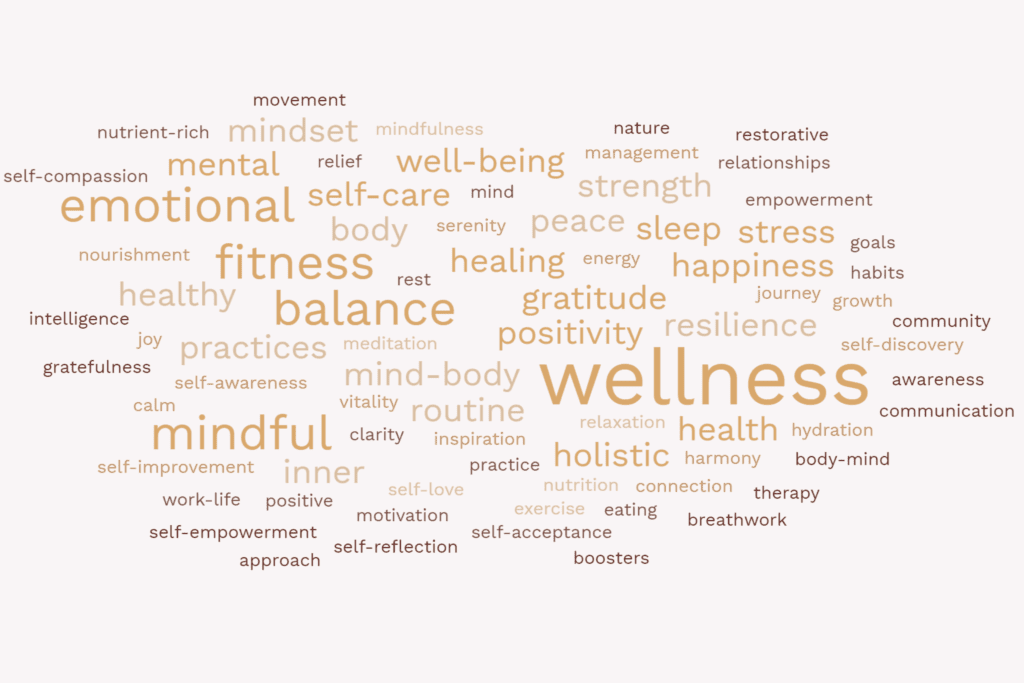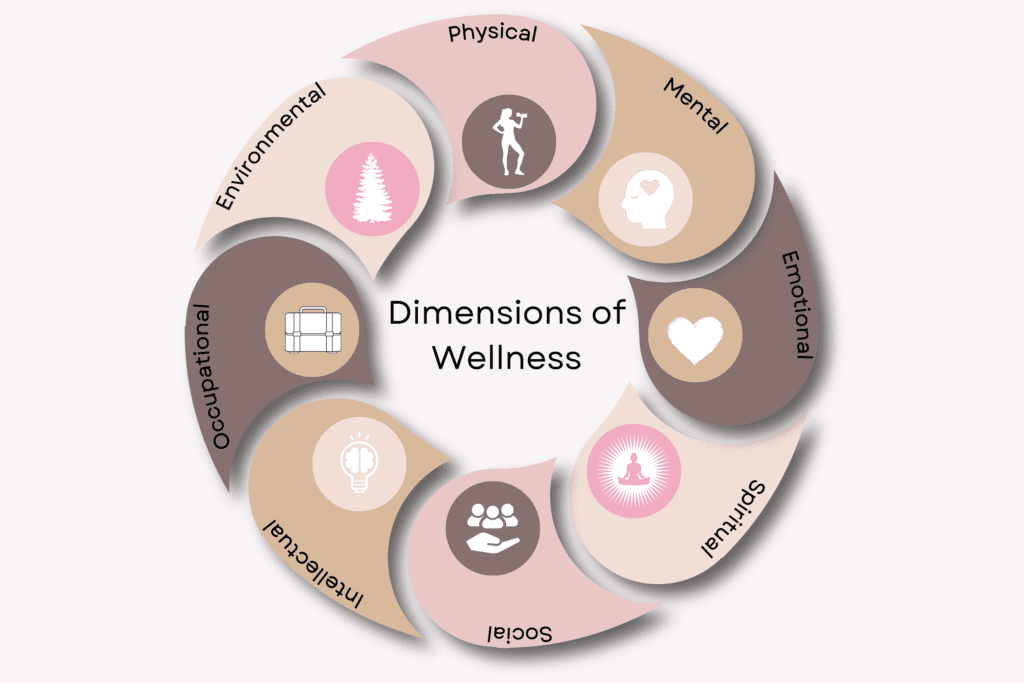
Eating healthily, getting sufficient sleep, and regularly exercising – all these things come to mind when you hear the word “Wellness“, right? While these habits certainly play a significant role, wellness requires a more holistic perspective.
The pandemic has pushed the concept of wellness to the forefront and has become a global trend that has touched every corner of our lives.
From advertisements and magazines to social-media influencers, we are bombarded with the word “wellness” daily.
In the midst of all the marketing and commercialization, you need to remember that true wellness goes beyond product placements and health guarantees. It involves taking a holistic approach to your life.
The lockdown brought about by the pandemic forced us to confront the reality of our lives and made us take an honest look at what truly mattered to us.
With the hectic pace of modern life, it’s all too easy to lose sight of our health and well-being, but the lockdown provided us with an opportunity to reassess our priorities.
The importance of wellness cannot be overstated, as it is the foundation upon which a fulfilling life is built. Life without good health and well-being is devoid of meaning, so we must take the time to understand and cultivate wellness in our daily lives.
In this article, we will dive deeper into the concept of wellness, exploring its definition, importance, and the various facets that contribute to a holistic sense of well-being.
What is Wellness and Why is it Important?

Understanding Wellness
Different people have their own versions and narratives of wellness based on their experiences and understanding of what they see and perceive from the world around them.
We come across advertisements on tons of natural products and quick fixes that give us assurances of wellness. Advertisements about celebrity secrets and magical recipes that will make us look young and healthy in no time.
While chronic disease rates and mental health conditions are on the rise, these companies are doubling down on their sales and making big profits in the process by selling us “wellness”, so it’s time we take matters into our own hands and recognize that wellness is not in any product or expensive program, but in proactively taking care of every aspect of your being.
Wellness is defined as “a state of complete physical, mental, and social well-being and not merely the absence of disease or infirmity.” by WHO.
We should think of wellness as an integrated concept that encompasses all aspects of our lives, from the physical to the spiritual.
It includes many factors such as physical health, relationships, work life, spiritual fulfillment, financial stability, and environmental sustainability.
Wellness is not a one-time achievement, but a continuous journey that requires us to make conscious efforts and intentional choices.
It’s about making informed and proactive decisions that help us lead healthier, more purposeful, and fulfilling lives.
You can achieve your full potential through wellness, manage daily stressors easily, be productive and efficient at work, and contribute meaningfully to the communities and society.
In short, wellness is a way of leading a well-rounded, balanced, healthy, and happy life.
Why is Wellness So Important?
Over the past couple of decades, we’ve seen things change so fast. Rapid advancements in technology have provided us with new tools and devices to make our day-to-day life easier.
Every other day, we hear about a new technology or device that will simplify our lives in some way.
We spend hours on gaming consoles, smartphones, and other tech devices that keep us indoors and confined to our apartments, keeping us from engaging in any sort of physical activity.
All these innovations have certainly made life more convenient, but they also have a negative aspect.
This sedentary lifestyle is making us lazy and stealing the very essence of what it means to be humans as we were not meant to be confined to a single place or limited in our movements.
We live in a jungle of concrete buildings and at times we go for days, or even weeks, without stepping foot outside our homes. We’re an extension of this planet and for us to be healthy and well, we need to keep our bodies active and connected with mother nature.
The young generation doesn’t know how to survive without fast-food and modern technologies. Life has become so fast-paced that we don’t have time to prepare a proper healthy meal for ourselves and our children.
We’re so dependent on fast, easy, and cheap foods that we’ve become the most unhealthy eating generation in history. Kids and even young adults these days can’t survive without Taco Tuesdays and Pizza nights.
You must have heard of the old saying that “change is the only constant in life”, yet it’s in human nature to resist change.
But if we don’t embrace the change today and make necessary changes to our lifestyle, we’ll be creating a generation that won’t outlive their parents.
Who is Wellness Possible For?
Now this question arises and some people might wonder, who is wellness achievable for? Is it only for those who live a healthy lifestyle with a balanced diet, daily exercise, and effective stress management?
If so, what about people suffering from some form of ailment or struggling with health conditions such as hypertension, anxiety, heart problems, diabetes, etc.?
And what about those who may seem fine on the outside but are living with a chronic condition like Fibromyalgia and experiencing pain on a daily basis?
Chances are that you’re familiar with such people in some way and certain aspects of them may remind you of your family member, friend, colleague, someone else you know, or maybe yourself.
Well, the answer is every single one of them. Regardless of what life throws our way, wellness is always possible for all of us.
Every single one of us is a unique individual with all our quirks and complexities. No matter what circumstances or situations you are going through right now, wellness is always possible because it comes from within.
8 Dimensions of Wellness
There are multiple aspects to our existence, and all of them are interconnected with each other.
Wellness is about nurturing all those aspects or dimensions of our existence because each dimension is equally vital and neglecting even one of them can impact the overall balance of our well-being. Let’s have a look at these different dimensions.

1. The Physical Dimension of Wellness
You must be well aware of this aspect of wellness because it is the most talked about. It refers to caring for your physical body so you stay healthy, physically fit, and free of all diseases, illnesses, and injuries.
It involves taking care of your physical body through exercise, nutrition, and proper sleep. The importance of physical wellness can’t be overstated as it directly impacts your energy, mood, and overall quality of life.
Just think about it, can you do anything if you’re injured, ill, or simply run down? You can’t, and your first priority at that point is to get well before you think about doing anything else.
There are certain things you can do regularly to improve your physical health:
- Eat Well: This means eating less or completely cutting down on processed, sugary, and fried food and including more raw food like fruits and vegetables in your diet.
- Exercise: You can start small and gradually progress to intense exercising.
- Sleep Schedule: Maintain your sleep schedule and get good quality sleep.
- Practice Hygiene: This would reduce the chances of getting a disease or infection.
2. The Mental Dimension of Wellness
The other crucial aspect of our overall well-being which is often overlooked in this fast-paced world is mental wellness.
Our mental health affects how we perceive and respond to life’s challenges, opportunities, relationships, and situations. It’s the cornerstone of how we think, feel, and behave and how we connect with others.
When our mental wellness is balanced, we are better equipped to manage stress, make positive decisions, build healthy relationships, and experience joy, peace, and happiness.
However, when our mental wellness is unbalanced, it can lead to a range of mental health issues such as anxiety, depression, mood swings, and low self-esteem.
Mental health has always been overlooked but the recent coronavirus pandemic brought about some change and pushed this issue to the forefront of public disclosure.
Even now, some people and organizations are yet to realize the importance of mental health but things have started to change and we see initiatives to promote mental health in workplaces.
But we have a long way to go in terms of making people aware of the importance of mental wellness and ensuring that everyone has access to the resources and support they need to live a fulfilling life.
Having good mental health is not just about being free from mental illnesses, but rather having a state of mind where we feel confident, capable, and in control of our emotions and thoughts. There are a number of things you can do to manage your mental health, some of them are:
- Meditation
- Journaling
- Practicing any hobby such as sketching, drawing, or painting
- Regular exercising or playing a sport
- Proper nutrition as some fats are essential for your brain
Apart from these, having good mental health is about nurturing positive relationships, engaging in activities that bring us joy, and living this life in the most beautiful and fulfilling way.
3. The Emotional Dimension of Wellness
This aspect of wellness is closely linked with mental well-being but this dimension is all about taking care of your feelings, acknowledging their validity, and making the effort to give them the respect they deserve.
It’s about understanding that emotions are a part of being human and come in all shapes and sizes.
And rather than trying to ignore or suppress your emotions, you should embrace them and make time for the activities that lift you up and foster a positive outlook.
It’s about prioritizing your emotional well-being and giving it the importance it deserves.
4. The Spiritual Dimension of Wellness
Being spiritual is often confused with being religious. Spirituality is believing in something greater than yourself and searching for the meaning and purpose of life.
It involves having your own beliefs, values, and practices that bring a sense of inner peace and fulfillment and gives direction to your life.
Being religious on the other hand means believing in an organized system of beliefs, rituals, and practices surrounding a deity or deities, and often involves a specific set of moral and ethical codes.
Spirituality is a larger umbrella and being religious falls under that. It totally depends on you whether you want to follow a particular religion or not.
If the beliefs and values of any religion resonate with you, then you can follow that otherwise you can have your own set of values and beliefs that you can abide by.
Being spiritual means living an authentic and fulfilling life with a sense of connection to something greater than oneself.
And this connection can promote mental and emotional health by bringing peace, calm, and inner strength.
Spirituality involves practicing meditation, mindfulness, and self-reflection, which can have a positive impact on your overall health.
5. The Social Dimension of Wellness
In simple terms, social wellness is about having healthy relationships and interactions with the people in our lives, including family, friends, colleagues, and community.
These relationships provide us with a sense of belonging, support, and connection, which in turn contributes to our overall well-being as they help us manage stress and cope with life’s challenges.
They become our support system, a shoulder to lean on, and someone to confide in.
Research has shown that people who have positive, healthy, and genuine relations with the people around them tend to live longer and are able to manage stress better because they have the support of those people, they can share their problems, happiness, sorrow, and grief with those people.
6. The Intellectual Dimension of Wellness
Intellectual wellness is about increasing your cognitive abilities by stimulating your mind and keeping it active through learning and personal growth opportunities.
It’s about seeking knowledge, expanding your skills, and challenging yourself to think critically and creatively.
It’s about engaging in activities that promote intellectual growth and expansion, such as reading, writing, learning new skills, and engaging in discussions and debates.
By embracing intellectual wellness, you can enhance your problem-solving abilities, decision-making skills, and overall sense of purpose and meaning in life.
7. The Occupational Dimension of Wellness
Occupational wellness is a crucial aspect of overall well-being, as a significant part of our daily lives is spent at work. It encompasses finding a job that provides fair compensation, and respect, and promotes a healthy work-life balance.
Additionally, it involves finding fulfillment and purpose in one’s career, while also prioritizing physical, mental, and emotional health while on the job.
This includes setting achievable goals, managing stress levels, and avoiding burnout to maintain a harmonious balance between work and personal life.
8. The Environmental Dimension of Wellness
The Environmental Dimension of Wellness is all about our relationship with the world around us and our impact on the environment.
It pertains to the physical world in which we live, work, and play. It’s about being conscious of our actions and how they impact this planet.
We should make deliberate efforts to reduce our carbon footprint, promote recycling, conserve energy, and use eco-friendly products.
We’re an extension of this planet so we should try and spend as much time we can in nature and make conscious efforts to make this world a better place.
The Last Piece of the Puzzle: Kindness
As the old saying goes, kindness is the language that the deaf can hear and the blind can see. Kindness is not just a warm and fuzzy feeling, it’s a transformative force that has the power to change lives, communities, and even the world.
In the 1970s, scientists wanted to understand the effect of effects of a high-fat diet on heart health so they conducted an experiment on a group of genetically identical rabbits.
While their genes and diets were uniform, their results were surprising. One group of rabbits was faring much better than the others despite the unhealthy diet.
After closer examination, the scientists discovered that one rabbit group was receiving special treatment, causing the difference.
One researcher was not only providing them with food, but also showering them with love, affection, and kindness. She would pet them, talk to them, and hold them, providing them with a warm and loving touch.
This observation led to the conclusion that kindness, love, and social interaction can profoundly impact one’s health and well-being.
This is now famously known as “The Rabbit Effect“. The study shows that acts of kindness and love can positively impact our health and overall well-being, even in the midst of unhealthy conditions.
Wrapping up!
By now you would have got a fair idea that wellness is a holistic concept that involves nurturing all aspects of your life – physical, emotional, intellectual, social, spiritual, environmental, and occupational – to ensure that you are living a well-balanced, fulfilling, and healthy life.
And remember, the secret ingredient to wellness is kindness and humility. It doesn’t cost you anything but at the same time, it makes all the difference in the world.
By spreading kindness and being humble, you are not only making the world a better place but also improving your own well-being. As the saying goes, what goes around comes around.
So, treat others with the same kindness and respect that you wish to receive, and watch your life transform for the better. Namaste!
Although we strive to provide accurate general information, the information presented here is not a substitute for any kind of professional advice, and you should not rely solely on this information. Always consult a professional in the area for your particular needs and circumstances prior to making any decision.







Leave a Reply